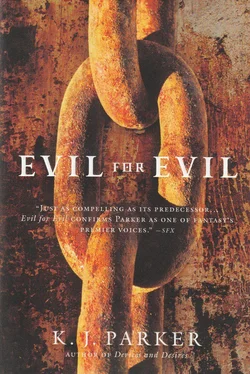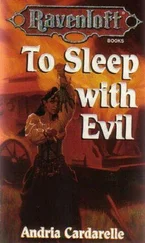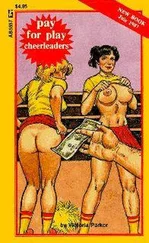K Parker - Evil for Evil
Здесь есть возможность читать онлайн «K Parker - Evil for Evil» весь текст электронной книги совершенно бесплатно (целиком полную версию без сокращений). В некоторых случаях можно слушать аудио, скачать через торрент в формате fb2 и присутствует краткое содержание. Жанр: Фэнтези, на английском языке. Описание произведения, (предисловие) а так же отзывы посетителей доступны на портале библиотеки ЛибКат.
- Название:Evil for Evil
- Автор:
- Жанр:
- Год:неизвестен
- ISBN:нет данных
- Рейтинг книги:4 / 5. Голосов: 1
-
Избранное:Добавить в избранное
- Отзывы:
-
Ваша оценка:
- 80
- 1
- 2
- 3
- 4
- 5
Evil for Evil: краткое содержание, описание и аннотация
Предлагаем к чтению аннотацию, описание, краткое содержание или предисловие (зависит от того, что написал сам автор книги «Evil for Evil»). Если вы не нашли необходимую информацию о книге — напишите в комментариях, мы постараемся отыскать её.
Evil for Evil — читать онлайн бесплатно полную книгу (весь текст) целиком
Ниже представлен текст книги, разбитый по страницам. Система сохранения места последней прочитанной страницы, позволяет с удобством читать онлайн бесплатно книгу «Evil for Evil», без необходимости каждый раз заново искать на чём Вы остановились. Поставьте закладку, и сможете в любой момент перейти на страницу, на которой закончили чтение.
Интервал:
Закладка:
The sacks of clothing made an adequate nest. Miel put a sack under the crook of his bad knee, which helped reduce the pain whenever the cart rolled over a pothole. The driver seemed to have forgotten about him, or maybe he wasn't in the habit of talking to the stock-in-trade. Miel leaned back and watched the light drain out of the sky.
He wouldn't have thought it was possible to go to sleep in an unsprung cart on those roads; but he woke up with a cricked neck to see darkness, torchlight and human shapes moving backward and forward around him. "Come on," someone was saying, "out you get." It was the tone of voice shepherds used at roundup; fair enough. He edged along the floor of the cart and put his good leg to the ground.
"Need a hand?"
"Yes," he replied into the darkness, and someone put an arm round him and took his weight. He hobbled for a bit and was put down carefully next to a fire. "You stay there," said the voice that came with the arm; so he did.
It wasn't much of a fire-peat, by the smell-and the circle of light it threw showed him his own bare feet and not much else. Well, they hadn't tied him up, but of course they wouldn't need to. He had nowhere to go, and only one functioning leg. If they were going to kill him they'd have done it by now. Miel realized that, for once in his life, he didn't have to take thought, look ahead, make plans for other people or even himself. His place was to sit still and quiet until called for, and leave the decisions to someone else. To his surprise, he found that thought comforting. He sat, and let his mind drift.
He supposed he ought to be worrying about the resistance, but the concept of it seemed to be thinning and dissipating, like the smoke from the fire. He considered it from his new perspective. He had been using every resource of body and mind left to him to fight the Mezentine occupation; what about that? Until today, he'd managed to make himself believe that he was doing a reasonable job. He'd won his battles; he counted them: seventeen. At least, looking at each encounter as a contest, he'd done better than the enemy. His ratio of men lost to enemies killed was more than acceptable. He'd disrupted their supply lines, wrecked carts and slaughtered carthorses and oxen, broken down bridges, blocked narrow passes. For every village they'd burned, he'd made them pay an uneconomic price in men, time and materiel. A panel of impartial referees, called in to judge who had made a better job of it, him or his opponent, would show him significantly ahead on points. But winning… Winning, now he came to think of it, meant driving the Mezentine armies out of Eremia, and he understood (remarkably, for the first time) that that was never going to be possible. He might be winning, but his people weren't. They didn't stand a chance.
But they weren't alone, of course. Silly of him to have forgotten that: the Vadani were helping him, or rather the other way about. His job (the Vadani agent had explained all this) was to keep up the pressure, make a nuisance of himself, cost the enemy money. The purpose of this was to undermine the enemy's political will, to give the Mezentine opposition a chance to bring down the government. Excellent strategy, and the only way to beat the Perpetual Republic. So, you see, we can still do it, and it doesn't really matter how many villages get burned or how many people get killed; we're just one part of someone else's greater design…
He frowned. The smoke was stinging his eyes. That morning, he'd been able to see the design quite clearly, as though it was a blueprint unrolled on a table. Since then, he'd been bashed on the knee and left for dead, and somehow that had made a difference. It was almost as though a ship had sailed away and left him behind. He'd heard stories about men who'd been stranded on islands or remote headlands. A simple thing, the unfurling of sails, the raising of an anchor; a few minutes either way, the difference between boarding a ship and not making it. In his case, a bash on the knee and another one on the head. In the stories, the castaways accepted that the world had suddenly changed; they'd built huts on the beach, hunted wild goats and cured their hides for clothing, until the world happened to come by again, pick them up and take them home. Those were the ones you heard about, of course. The ones who were never rescued by passing ships, or who simply lay on the beach and waited to die, were never heard from again and therefore ceased to exist.
Miel thought: I've lost everything. I was the Ducas, the head of the family, the Duke's principal adviser, Orsea's best friend. I had land and houses and money, hawks and hounds, clothes and weapons. Thousands of people depended on me. They lived their lives through me, I was the one who made their decisions for them, decided what they should be doing. I wasn't just one man, I was thousands; I was Eremia. Now I can't even walk on my own, and I've got nothing, not even a pair of boots.
I was…
Perhaps it was just the sting of the smoke. He rubbed his eyes, and thought about it some more.
Well, he thought, I suppose it's because I was born to it. Orsea wasn't, and that's probably why he did so very badly. All my life I've been aware of it, the responsibility for other people, the knowledge that I can't just do what I want, because so many people depend on me. I could argue that that makes me a good man-except that I had the houses and the land, the hawks and hounds, and I never had to lean on plow-handles in the baking sun or stoop over all day hoeing onions. But I never chose anything, not for myself. I have always tried to do the right thing, because people depended on me.
Someone was standing over him; he looked up. He couldn't make out a face, only a shape. Someone leaning forward a little, holding out a bowl.
"Thanks," he said, and took it. The man walked away.
Well, it was porridge, or maybe very thick soup; something cheap you could boil up in bulk; something that someone had had to work for, and which he'd done nothing to earn. He scooped a wodge of the stuff onto his fingers and poked it into his mouth. It didn't taste of anything much, which was probably just as well. There are different sorts of dependence. There's the social contract between the lord and his people, and there's the man who feeds barley mash to his pig. He thought about that too, while he was at it. Without the farmer, the pig would starve; without him, the pig would never have been born. The pig owes the farmer its life, and in due course the debt is called in, just as my bailiffs collect the rents from my tenants.
He finished the whatever-it-was, put down the bowl and looked round. A few people were still moving about, but mostly there was the stillness of rest after hard work; of men whose only resource was their strength, saving it up for another day. If I could walk, Miel thought, I could offer to help them tomorrow with digging the graves. I can't even do that. I can't do anything.
He lay back. There was a stone or something just under his shoulder blade; he wriggled about to avoid it. Nothing to do; he'd have expected to be bored, since all his life the one thing he could never abide was doing nothing. It wasn't like that, though. It was dark, so it was time to sleep; or, if sleep didn't happen to pass by his way, he would be content to lie still and wait for the dawn. Gradually, awareness of time slipped away from him, and then he slept.
When he woke up, there was someone standing over him again. He recognized the boots.
"On the cart," the man with the mustache said. "Here, I'll give you a hand up."
Miel nodded, and let himself be lifted. "Are we going back to the battlefield?" he asked.
The man frowned, as though he hadn't expected to be asked a question, and wasn't quite sure it wasn't against the rules. "You go back to the camp," he said. "They'll look after you there."
Читать дальшеИнтервал:
Закладка:
Похожие книги на «Evil for Evil»
Представляем Вашему вниманию похожие книги на «Evil for Evil» списком для выбора. Мы отобрали схожую по названию и смыслу литературу в надежде предоставить читателям больше вариантов отыскать новые, интересные, ещё непрочитанные произведения.
Обсуждение, отзывы о книге «Evil for Evil» и просто собственные мнения читателей. Оставьте ваши комментарии, напишите, что Вы думаете о произведении, его смысле или главных героях. Укажите что конкретно понравилось, а что нет, и почему Вы так считаете.












